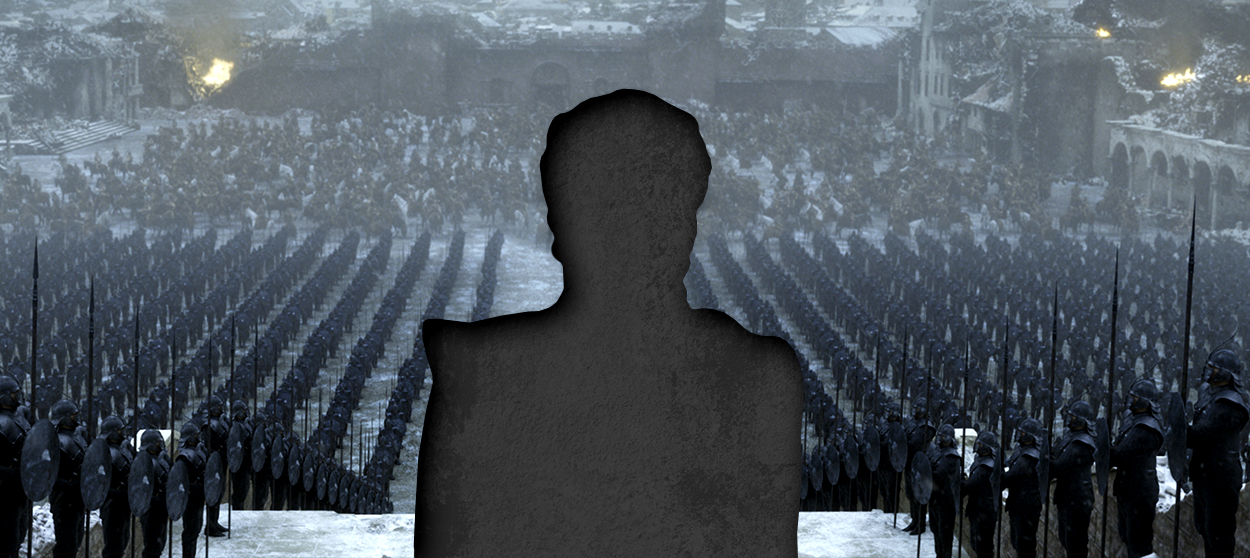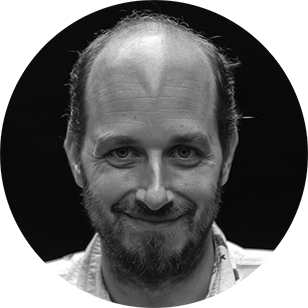Game of Thrones' last big reveal
A story built on what the audience doesn't see has one big question remaining


A free daily email with the biggest news stories of the day – and the best features from TheWeek.com
You are now subscribed
Your newsletter sign-up was successful
Game of Thrones has long had a habit of putting important scenes off-screen, as when Jon Snow's parentage was revealed and Sansa and Arya said ... well, we don't know what they said, do we? When Tyrion begs Cersei to send her army north — and apparently thought he had succeeded — we don't see the crucial moment when she apparently lied to him. When Sansa and Littlefinger planned to bring the Knights of the Vale to the Battle of the Bastards, it happened without the audience's knowledge, and when Arya and Sansa conspired to make Littlefinger think his plot was working, they apparently did it off-screen. We spent eight seasons wondering what the Night King's plan was.
Most recently, we don't know what Daenerys was doing when she was busy not eating and not receiving visitors (and not being poisoned) in her Dragonstone chambers. Was she planning? Grieving? Raging? We also don't see her face when she's strafing King's Landing. After she makes the crucial decision to not merely attack the Red Keep — where Cersei is — but to indiscriminately massacre thousands of innocents on the way, we only see the dragon from a distance, first from above, and then, for the rest of the episode, from the terrifying view-from-below of the fire-bombing's victims. Was her face contorted with rage and grief? Cackling with madness? Grim with righteous zeal? Did she take pleasure in watching women and children burn or was she cold and indifferent?
Because we don't know, we can only guess why she does it; because we don't know what it means, we must keep watching to find out.
The Week
Escape your echo chamber. Get the facts behind the news, plus analysis from multiple perspectives.

Sign up for The Week's Free Newsletters
From our morning news briefing to a weekly Good News Newsletter, get the best of The Week delivered directly to your inbox.
From our morning news briefing to a weekly Good News Newsletter, get the best of The Week delivered directly to your inbox.
These omissions are not new. The entire show has revolved around off-screen conspiracies since the very beginning, always leaving the audience waiting and speculating, in suspense. Who killed Jon Arryn? Who poisoned Joffrey? By the time we found out the answers, we'd almost forgotten the questions. And like a soap opera, the show has a way of producing cliffhangers by cutting to a new scene right at the moment of highest drama, after some irrevocable action has been taken or new information revealed; frustration becomes suspense, and a narrative plunge forward: if something is omitted, then the scene isn't complete, satisfaction withheld, and you can't stop watching. There was always more to come; when you didn't understand what just happened, you had to wait until next week (or next season).
Something crucial has changed, however: there isn't any more to come. This is the last season; the next episode will be the finale. And since the showrunners reduced the final two seasons to only 13 episodes total — rather than the full 20 HBO had wanted — events have been moving incredibly fast; every scene either advances the plot or ties off a storyline. Suspense is therefore counterproductive: anything not explained, now, never will be; as the show gets closer and closer to actually reaching the ending, the narrative stakes not only rise, but the omissions become much more glaring, much more frustrating.
And so, the question of what Daenerys is thinking and feeling about what she has done is now the most important question of the show. Is she the "Mad Queen"? "The Prince Who Was Promised"? Does this story have a happy ending, or a tragic one? The teaser trailer for Sunday only shows her from behind, braids instead of her face; we must wait until Sunday for the show's big question, her story, to finally be resolved.
Or will it?
A free daily email with the biggest news stories of the day – and the best features from TheWeek.com
Another thing that has changed as we've barreled towards a conclusion is that the show's world has come to seem strikingly small. After all, in the lead-up to the attack on King's Landing, virtually every surviving character in the show had found their way to Winterfell; in the post-game celebrations in the drinking hall, Cersei and the people who would die with her (RIP: Qyburn, The Mountain, and Euron Greyjoy) were virtually the only cast members not present. The side that won "the last war," in other words, is now the entire surviving cast. No one else is left.
In the early seasons, the show had a much more panoramic perspective, with cast members scattered across far-flung locations (and interacting with a variety of non-primary characters). Many or most of them had no idea what the others were doing, or even who they were; it was only at the 23-mile mark of this marathon, after all, that Jon Snow and Daenerys met for the first time. This meant that the world felt big, filled with unrevealed answers to all the show's questions; anything that was obscure, we could have faith that it would (or could) eventually be revealed. We would find out, for example, what the Night King's big plan was, and the machinations of destiny — Ice! Fire! The Prince Who Was Promised and the Children of the Forest — would all make themselves known. In the meantime, the show was absolutely lavish with information we didn't, technically, need for the plot; so many of the show's best scenes were downtime or "meanwhile" conversations, while our characters were traveling, waiting, or braiding hair.
This was because, for most of the show's run, we were following characters who were quite far from the centers of power. The scattered Stark, Targaryen, and Lannister children — and the variety of vassals and lords and errant knights whose masters had abandoned them or died, or who they had abandoned or killed — were all running from their enemies and struggling to survive; if they were part of the Game of Thrones, they were not the major players (and if they were, they were killed). Buffeted by the waves and currents of a crown politics that tended to happen off-screen, we in the audience watched the show from the perspective of (relatively) ordinary people about to be crushed as the great houses made war with each other; we were Arya watching Tywin, or Sansa learning from Cersei, or Jon Snow getting news of his family's butchering. We, like them, watched the game from the sidelines.
What changed in the last few seasons is every king, queen, and great house in the seven kingdoms has come to a gruesome end, along with the great behind-the-scene conspirators, Varys and Littlefinger. Our once-scattered and once-marginal protagonists have not only replaced them at center stage, but there is now no "offstage" at all: with the entire power structure of Westeros burned to the ground, one person has replaced it, Daenerys Stormborn. She has won the Game of Thrones; everyone else will either win with her, or they will die.
It's therefore fascinating that at this moment when the question of her matters so much — when everything hinges on whether she is different, whether she will break the wheel and make a better world, or whether she's just another mad dragon — the show has suddenly withheld her, put her major decisions offstage. As she has become the only power in the show's world, we, the audience, have been placed in the position of all of those beneath her: Arya, Tyrion, and Jon, looking up from the smoldering rubble. Like us, they are waiting and speculating, in suspense: now that she has won, what kind of Targaryen has come to the throne? Which side of the coin has come up? Can you win a throne through fear but rule with love?
I suppose we shall see, one last time; tune in Sunday night to find out! However it goes, I suspect the show has given us a clue in this last, terrifying withholding. As Daenerys has become the undisputable power in the seven kingdoms — and, in fact, in the world — the camera has stopped showing us the world from her perspective. We've stopped seeing what she sees, and stopped identifying with her dilemmas; as she has gone from victim and survivor to victor and queen, the show finds that it can no longer sympathize with her perspective.
What does absolute power feel like? She is the "Mad Queen," certainly, but what is her madness? Is it rage, insanity, or anguished zeal?
I think the show has no idea, but I want to suggest that this is actually the best thing about it. Power has always been off-screen in Game of Thrones because it's never really been a show about what having power is like. It's always been a show about suffering from power. As we have watched the cast struggle to survive the machinations of the powers that be, those powers have always been just beyond their (and our) perception, just offstage. And as everyone who has thought they had power and tried to exercise it has died, we've learned that no one really had it. "When you play the game of thrones, you win or you die," Cersei once declared, a phrase that keeps coming back because, after all, that's the name of the show; it makes it seem like the game is something you could win. But "valar morghulis" and "valar dohaeris" are the flip side of that coin, the High Valyrian sayings that all must die and all must serve. There is no escape; no one wins.
The best thing about this show, I think, is that it hasn't made power itself interesting or sympathetic. If superhero movies let us exercise fantasies of omnipotence and invulnerability — letting audiences fly like Iron Man, smash like Hulk, and snap like Thanos — Game of Thrones has never let us feel in control; the only characters who are safe are the ones who are already dead. What we have in common with the show's cast, in other words, is that we are not kings and queens or superheroes; we are all ordinary people, struggling to understand and survive a world whose fury and malevolence often seems as unknowable and unpredictable as the flip of a coin (and as hopelessly implacable as a dragon or an army of the dead).
This is why Daenerys has had to disappear from view: power is always off-screen. And so, after she won the game, the show stopped being about her. The Game of Thrones has never been about what it's like to win, only what it's like to lose. So the wheel keeps turning. And, like the rest of us, Westeros is left to guess, to speculate, and to fear.
Aaron Bady is a founding editor at Popula. He was an editor at The New Inquiry and his writing has appeared in The New Yorker, The New Republic, The Nation, Pacific Standard, The Los Angeles Review of Books, and elsewhere. He lives in Oakland, California.
-
 How the FCC’s ‘equal time’ rule works
How the FCC’s ‘equal time’ rule worksIn the Spotlight The law is at the heart of the Colbert-CBS conflict
-
 What is the endgame in the DHS shutdown?
What is the endgame in the DHS shutdown?Today’s Big Question Democrats want to rein in ICE’s immigration crackdown
-
 ‘Poor time management isn’t just an inconvenience’
‘Poor time management isn’t just an inconvenience’Instant Opinion Opinion, comment and editorials of the day
